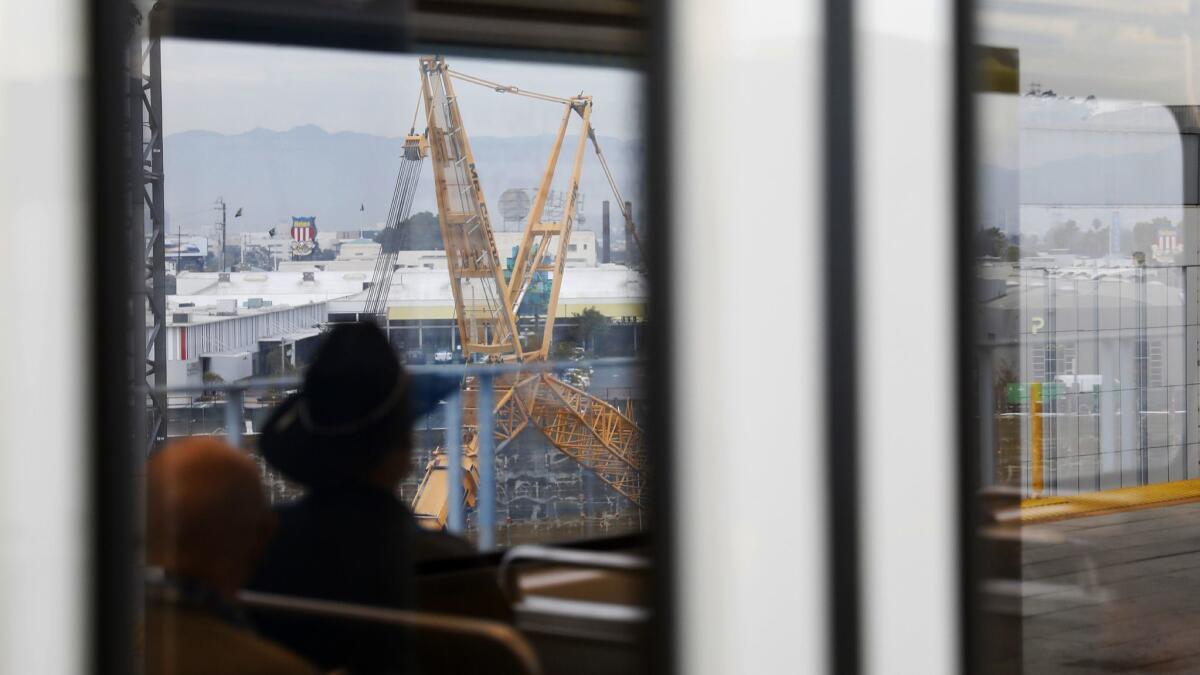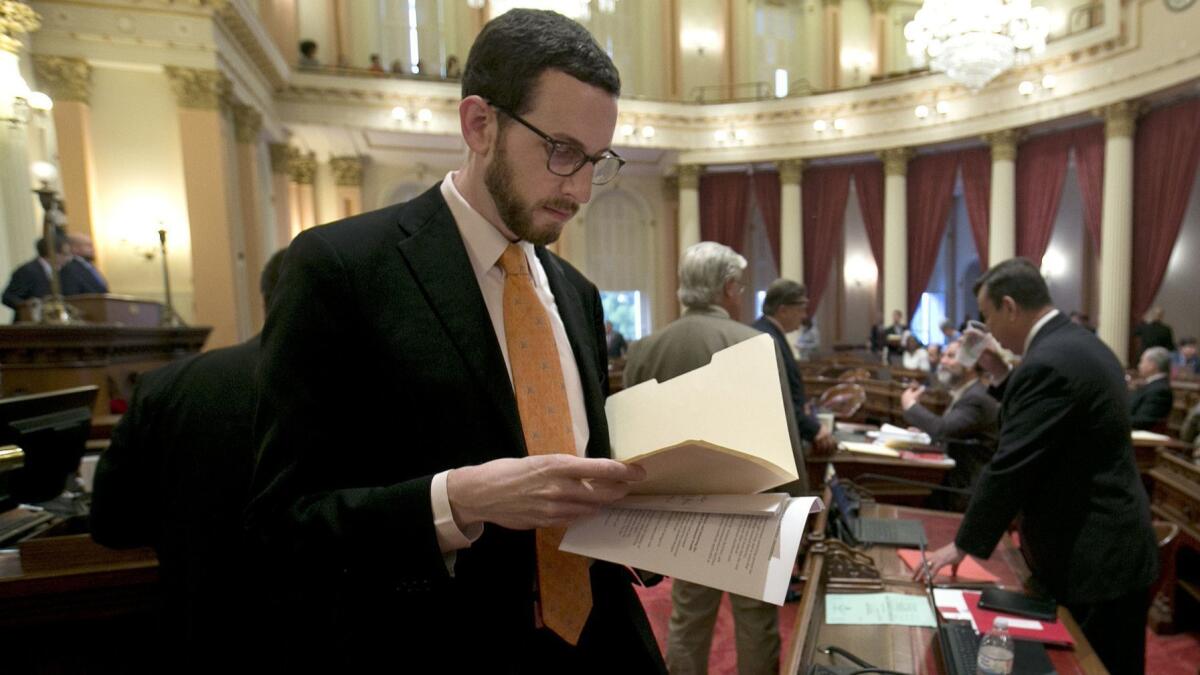A major California housing bill failed after opposition from the low-income residents it aimed to help. Here’s how it went wrong

- Share via
Reporting from Sacramento — Two weeks before state lawmakers halted a plan to aggressively increase housing production near transit locations across California, dozens rallied outside San Francisco’s City Hall to argue their sides.
When Chinese, Filipina and black tenant activists spoke to fears that expanding housing this way will displace residents of their communities, supporters of the measure drowned out their voices with chants of “Read the bill.”
The scene of predominantly white protesters shouting over people of color fed a criticism that has dogged backers of recent legislative efforts to boost home building. In a twist on the term “NIMBY,” these mostly twenty- and thirtysomethings with white-collar jobs are referred to as “YIMBYs,” or “Yes, in my backyard.” Organizations like these have sprung up across California and the YIMBYs argue their efforts will benefit low-income people of color statewide.
Many don’t see it that way, and instead worry that developers would build housing catering only to wealthier, white residents, leading to higher prices that would force out those living in poorer communities now.
This divide was one of the primary reasons for the failure last month of Senate Bill 827, which would have allowed for the construction of four- or five-story apartment and condominium buildings within half a mile of transit stops.
Activists for low-income residents and communities of color said that they were blindsided by state Sen. Scott Wiener’s proposal and that subsequent efforts by the senator to protect against potential displacement and gentrification were inadequate. Wiener (D-San Francisco) and his allies have acknowledged they need to build better relationships with advocates for poor Californians and vowed to introduce a new bill in 2019. But for now, there is a fundamental disconnect between the approach of the senator and his supporters on one side and influential anti-poverty organizations on the other.
“The YIMBY movement has a white privilege problem,” said Anya Lawler, a lobbyist with the Western Center on Law & Poverty, a legal advocacy group and adversary of SB 827. “I don’t think they recognize it. They don’t understand poverty. They don’t understand what that’s like, who our clients really are and what their lived experience is.”
The tension over SB 827 arose because the bill would have made substantial changes to communities across California. Wiener argued his efforts were necessary to tackle two of the state’s most challenging problems: housing and climate change. The housing shortage has been estimated in the millions, driving up costs for poor and middle-class residents. And state environmental regulators have determined that California won’t meet its goals to significantly reduce greenhouse gas emissions by 2030 unless people drive less. By allowing for a boom in development near transit, Wiener sees his pitch as an attempt to make meaningful progress on both.
Much of the reaction was predictable. Local governments and neighborhood groups opposed the state taking over some power to shape communities. Environmental organizations were divided over whether it hurt residents’ ability to stop development or was a win in the fight against climate change.

California lawmakers killed one of the biggest housing bills in the country »
Some of the most passionate debates were over SB 827’s effects on those in poverty, many of whom can’t afford steep increases in housing costs. Wiener contends that by allowing for much more housing overall — alongside providing protections for existing residents — SB 827 would have helped keep people in their neighborhoods.
“The reality is that the heart of displacement is a lack of housing, which pours lighter fluid on housing costs, puts huge pressure particularly on low-income tenants and pushes people out,” he said.
Research from the state’s nonpartisan Legislative Analyst’s Office and UC Berkeley has found that building any new housing, especially homes subsidized for low-income residents, prevents displacement at a regional level. But the data are less clear on the effects of construction in individual neighborhoods, sparking concerns that relaxed zoning rules could cause development that would price out residents in poor communities.
Neighborhood activists in historically black and Latino South Los Angeles spent a decade devising blueprints to guide future growth that the Los Angeles City Council approved at the end of last year. Many of the same organizations supported a successful 2016 citywide ballot measure that allows developers to increase density and raise height limits near certain transit stops — but only if they agree to set aside portions of their projects for low-income residents.
SB 827, which in an early iteration would have in effect rezoned broad swaths of Los Angeles, alarmed activists, said Laura Raymond, campaign director for Alliance for Community Transit-Los Angeles. Raymond said her members believed the bill would have undermined their prior work and forced those they represent out of their homes. Her group opposed the legislation soon after Wiener introduced it.
“We need to be involved from the beginning,” Raymond said. “We need equity to be the aim of the bill, not an afterthought.”
The principal supporter of SB 827 was California YIMBY, a statewide pro-housing organization founded this year. Brian Hanlon, the group’s executive director, said he understands the profound mistrust in low-income communities for sweeping development changes, given that 20th century urban renewal programs severed neighborhoods and led to decades of disinvestment.
“Someone that looks like me with a white paper walks into their community and says, ‘I know what’s best for you, listen to me,’” Hanlon said. “Well, the last time that happened they got screwed.”
In this case, Hanlon said, guarding against displacement and promoting affordable housing were always at the front of his mind. But because he was just starting his organization, Hanlon said he didn’t have time to meet with equity groups before the bill was released. He planned on addressing their issues as SB 827 moved through the Legislature.
Still, other events fed the belief that the bill’s backers had different priorities. One of California YIMBY’s first shows of support for SB 827 was a letter from more than 120 tech company executives, who are some of its biggest funders and often serve as lightning rods in the state’s gentrification debates.
Then, as the bill approached its April legislative hearing, the San Francisco Board of Supervisors planned to vote on opposing the measure. It was at dueling rallies outside City Hall beforehand where YIMBY activists shouted over Chinese, Filipina and black tenants who were opposed. Laura Clark, executive director of the Bay Area’s YIMBY Action, posted an apology calling her group’s actions “beyond insensitive” to those speaking about their own experiences with displacement. “I failed as a leader and as a person,” Clark tweeted.
The incident was symbolic of how YIMBY groups have operated, said Shanti Singh, a spokeswoman for Tenants Together, a renter group that organized against the bill.
“They’ve had a dismissive attitude toward communities of color,” Singh said.
Plan to dramatically increase development would transform some L.A. neighborhoods »
Wiener and Hanlon disagree and point to numerous changes made to the bill after feedback from equity organizations. SB 827 would have deferred to local rules, including those in Los Angeles, that force developers to include homes for low-income residents while adding similar standards in areas that didn’t already have them. Developers wouldn’t have been allowed to demolish rent-controlled housing without explicit local government approval. Even then, those developers would have had to offer new units in their buildings to existing tenants at their prior rents.
The measure ultimately garnered support from some low-income housing developers and activists in Silicon Valley and the broader Bay Area. Seventeen law professors and other national experts on housing segregation also endorsed SB 827, calling it “a major step towards promoting integration and reducing racial residential segregation.”
Many equity groups, however, weren’t swayed. They remained stung by how the bill was introduced and believed its tenant protections and affordability mandates didn’t account for varying needs in their communities.
Wiener’s approach also turned off state Sen. Jim Beall (D-San Jose), chairman of the Senate Transportation and Housing Committee, where SB 827 met its demise. By overriding some local controls on development, Beall said, the bill “disempowered minority communities.”
Coverage of California politics »
“I think generally, social justice is created by having government provide housing for all people,” Beall said. “Right now, the statistics show that predominantly the demand is for affordable housing and for homeless and [Wiener’s] proposal didn’t provide for that.”
Wiener and Hanlon said they are already meeting with organizations representing low-income residents in preparation for trying again. They also said those opponents should temper their critique of YIMBY organizations’ failure to garner a broader coalition this year.
“If they’d been around for 20 years, it would be a fair criticism,” Wiener said of YIMBY groups. “They’re a brand-new movement.”
More to Read
Get the L.A. Times Politics newsletter
Deeply reported insights into legislation, politics and policy from Sacramento, Washington and beyond. In your inbox three times per week.
You may occasionally receive promotional content from the Los Angeles Times.











